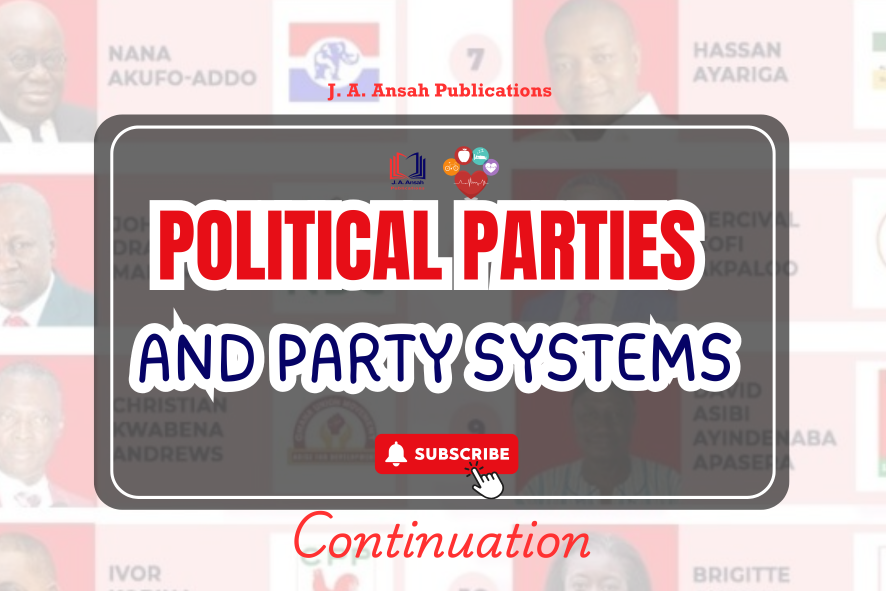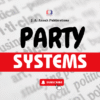POLITICAL PARTIES AND PARTY SYSTEMS
A political party is an organised group of people who endeavour to capture political power through elections to enable them control policies and machinery of government.
TYPES OF PARTIES
Definition of a political party: A Political Party can be described as a group of people with the same aim and ideology whose main goal is to capture political power so that they can implement the contents of their manifesto. A party could be either categorised as an elite party or can also be called a mass party.
Elite/Cadre Parties Vs Mass-Based Parties
Cadre parties normally organise a relatively small number of party adherents. Mass-based parties, on the other hand, unite hundreds of thousands of followers, sometimes millions. But the number of members is not the only criterion of a mass-based party. The essential factor is that such a party attempts to base itself on an appeal to the masses.
CHARACTERISTICS/OF A MASS PARTY
1. Type of membership: One of the features of an elite party is that its membership is opened to everyone from any walk of life. This type of party has as its members, people from across the wealth, education and professions. There are no boundaries to anybody who wants to become a member.
2. Leadership of mass parties: Another feature of a mass party is that it is led by popularly elected members. In a mass party, each person is eligible to lead the party as long as that person is able to demonstrate loyalty to the party and the things it believes in.
3. Works for the interest of all: A mass party serves the interest of the entire population. There is nothing like discrimination against a section of the people. This is unlike the elite party which works in the interest of a few people.
4. Funding: Mass parties fund their activities from the contributions of the mass of the members. These contributions are voluntary, and no member is compelled to do so. They also raise contributions from rallies organised for that purpose.
5. Vertical administrative structure: The organisational/administrative structure of a mass party is hierarchical in nature. Those who are elected at delegates’ conferences are charged with the obligation of managing the operations of the party until the next conference.
FEATURES OF AN ELITE PARTY
1. Restricted membership: One of the features of an elite party is that its membership is limited to only a certain category of people. This kind of party has as its members, persons of the upper class in society, businessmen, professionals like lawyers and doctors and people in academia.
2. Financed by a few: Another feature of an elite party is that it is financed by only a few rich people. These are Godfathers of the party and most of the time, call the shots from behind. In recent times, elite parties have used other sources, but the main sources of finance are the few.
3. Works for the interest of the few: The elite parties work solely for interest of a few of the people; they do not care much about the interest of the common people. They operate on the principle that once the few are provided for; it would trickle down to the masses.
4. Wealth, education and status is key: Elite parties consider closely the wealth, educational level and status of members. To have enough influence in an elite party, you must be wealthy, highly educated or must be the son or daughter of another member with that influence.
5. Decision making: An elite party does not have confidence in decision making by the broad masses of people. They believe that decisions must be taken by a few people within the party on behalf of the other members.
DIFFERENCES BETWEEN ELITE AND MASS PARTIES
1. Organisation: Elite parties depend on influential people in the society to mobilise supporters. Mass parties use extensive mass network of party organisation.
2. Leadership: Elite parties are led by notables such as chiefs, landed aristocrats, wealthy merchants, etc.
3. Membership: Membership of elite parties comprise mainly educated elite. Mass parties draw membership from the rank and file of the body politic.
4. Finance: Elite parties are financed by wealthy donors. Mass parties are mainly financed through subscriptions from members and organisations.
5. Mode of operation: Elite parties – constitutional methods. Mass parties – extra-legal methods, for instance demonstrations, etc.
6. Ideology: Elite parties – conservative. Mass parties – radical.
FUNCTIONS/MERITS OF POLITICAL PARTIES/PARTY SYSTEM
1. Political parties, first and foremost, should structure the electoral process by nominating competing candidates for office, by recruiting persons to participate actively in campaigns, and, thereby, by offering to citizens aggregated in territorial constituencies a choice between alternative sets of leaders.
2. Political parties should provide most citizens with a stable and distinctive set of ideas and goals (symbols) that anchor their expectations about democracy, orient them in a general way toward policy options, and make them feel part of the process of collective choice.
3. Political parties, once they have competed in the electoral process, should be capable of forming a government and of providing an internal structure to the legislative process whether they do so alone or in alliance with other parties and whether the executive and legislative posts are independently or concurrently filled.
4. Underlying all of the above functions is a single assumption: Political parties must be capable of aggregating the interests and passions of a significant proportion of the citizenry by channelling the expectations of these individuals, families, firms, associations, and movements through their internal processes and producing a program that mixes public policies in such a way as to satisfy the general demands of their constituents.
5. Political parties also provide many support activities for their candidates. They hold fundraisers, distribute literature, and encourage people to register to vote.
6. Political parties are also responsible for keeping an eye on each other and on the activities of the government. Parties out of power spend much of their time presenting an opposing view to the party in power. This helps to keep citizens informed of both sides of an issue.
7. They encourage political participation and socialisation. As an election draws nearer, they may perform polls and make phone calls to encourage voters to get out and vote. Each party helps to guide voters by advertising the party’s beliefs on issues of importance. This helps voters to know which party best matches their individual beliefs.
8. They provide alternative government.
9. They dramatise politics and keep the nation politically alive.
10. They make it possible for the government to be accountable to the electorate and provide the means by which government and opposition are kept in touch with public opinion.
11. Parties make articulate the inarticulate desires of the masses.
Subscribe to our newsletter!
DEMERITS OF POLITICAL PARTIES/THE PARTY SYSTEM
1. The party system encourages hollowness and insincerity – it duels on pretence and lies.
2. It limits the freedom of conscience and lowers the moral tone and the intellectual standard of society. People no longer follow their conscience and there is less objectivity in deliberations/thinking.
3. It encourages oligarchy and factionalism – a few people dictate to a whole nation. Alexander Pope referred to the political party as ‘the madness of the many for the gains of the few’.
4. It creates political fanatics and sycophants. Party members support for the sake of supporting and criticise for the sake of criticism. Political conformity is praised but political difference is ridiculed. Tact, flattery and the gift of the gap receive undue importance; truth, justice and reason recede to the background.
5. It encourages discrimination in the sharing of the national cake. The leaders tend to favour areas that vote for them at the expense of others. This leads to unequal development.
6. Political parties create divisiveness, unhealthy rivalry and tribalism, and for that matter lead to instability.
7. Political parties lead to maladministration, inefficiency, corruption and misappropriation of funds. Leaders try all means to get money to defray their campaign costs.
8. Party system promotes inefficiency in the administration. Citizens with expertise and experience, but who do not belong to the ruling party are not employed in government departments.
9. The party system can make political leaders become too powerful or even dictators, for instance, Dr Kwame Nkrumah.



